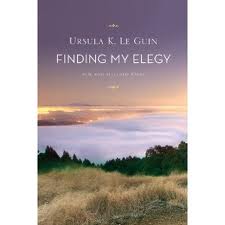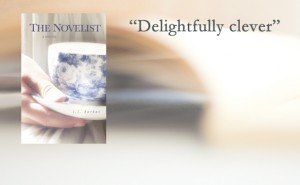My first encounter with writer Ursula Le Guin was her novel The Lathe Of Heaven, first published in 1971. Officially a science fiction classic, it’s actually much more encompassing than that—an exploration of limits to resources and the decisions, or dreams, you would make if you could change the future, and possibly the past. It’s still an amazing story.
Le Guin is something of a writing institution. It might be more correct to call her a writing monument—23 novels, 11 books of poetry, two poetry translations (in two different languages), a National Book Award, five Hugo and five Nebula awards, the Kafka Award, a Pushcart Prize, and an award from the American Academy of Arts and Letters.
Now 82, Le Guin has produced a twelfth volume of poetry, Finding My Elegy: New and Selected Poems, gathering works from previous collections and adding a significant number of new poems. In fact, the volume is sufficient for two works of poetry, and one suspects that Le Guin has pulled together some of her favorite poems and included new ones as a kind of possible life or work summary.
I say this because the title poem, “Finding My Elegy, ” contains hints and intimations of Thomas Gray’s famous poem (see last week’s article on Gray’s “Elegy Written in a Country Churchyard”). But it’s less certain and more tentative than Gray’s, because the poet can’t seem to find the elegy she’s seeking:

my elegy. There’s all too many graveyards handy
these days, too many names to read through tears
on long black walls, too many bulldozed bonefilled ditches.
And all the animals to mourn, wiped off
the earth like mist wiped off a mirror, leaving one
face, reflection of itself alone,
image of its imagined image; nothing else,
no grief, no dirt, no dogs, no elegies…
No matter where looks, she can’t find her elegy, until she sees “a woman who stands to speak a name.” And while she doesn’t know the name, she knows she’s found her elegy.
It’s a lovely poem, with a rather haunting air to it, not unlike Gray’s elegy.
A number of the poems in the collection are about writers and writing—no surprise, given her life’s work. Even these poems, though, have a sense of ending and finality about them.
Writers
Fortunate those who fill their hands
with stuff of the imagined thing
to shape the cup, the carven bird;
whose fingers strike from key or string
the ringing, single-complex chord,
actual, heard.
A writer’s work
is with the insubstantial word,
the image that can only find
it’s being in another’s mind.
We work with water, with the wind,
we make and hold no thing at all.
All we can ever shape or sing
the tremor of an untouched string,
a shift of shadows on the wall.
And that’s what underlies this collection—seeing the “shift of shadows on the wall.” I suspect she’s not yet finished with her work, but she is seeing the shift, and the poems in this volume reflect that.
Finding My Elegy is a quiet volume, an inspiring volume, full of thoughtful reflections and meditations, by one of the most esteemed writers of our time.
Photo by Kelle Sauer. Sourced via Flickr. Post by Glynn Young, author of Dancing Priest.
_____________________
Purchase The Novelist, by L.L. Barkat now!
- Poets and Poems: Forrest Gander and “Mojave Ghost” - March 27, 2025
- Poets and Poems: Siân Killingsworth and “Hiraeth” - March 25, 2025
- Poets and Poems: Donna Hilbert and “Gravity” - March 20, 2025


Chris Yokel says
Sounds fantastic.
Maureen Doallas says
Agree with Chris. I’ll add to my book list. Thank you, Glynn.
Diana Trautwein says
Years ago, when my children were small, I read everything of LeGuin’s I could get my hands on. I remember the fantasy/science fiction most. I am delighted to see there is a new volume of poetry and will put it on my wish list today. Thanks for the head’s up and the thoughtful review.